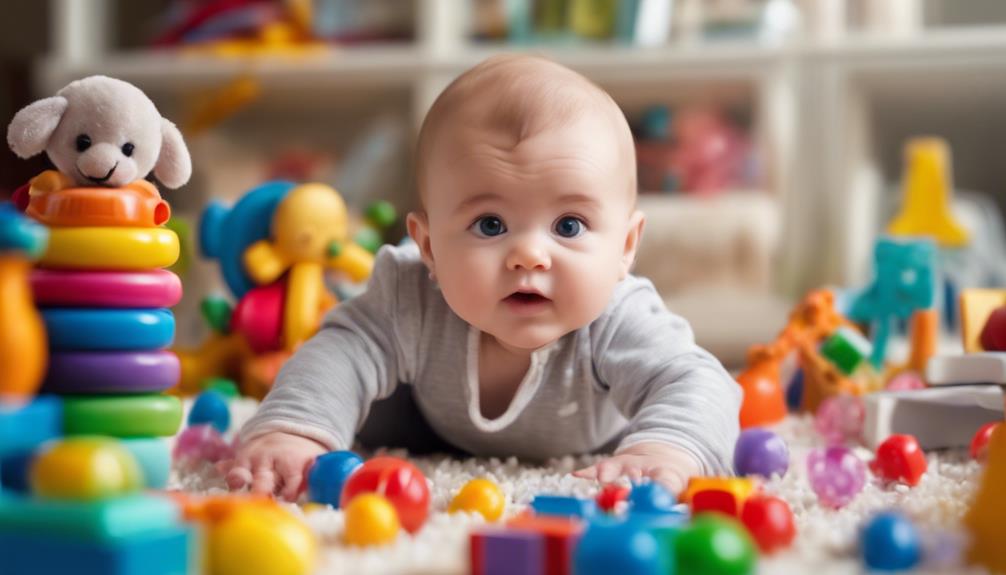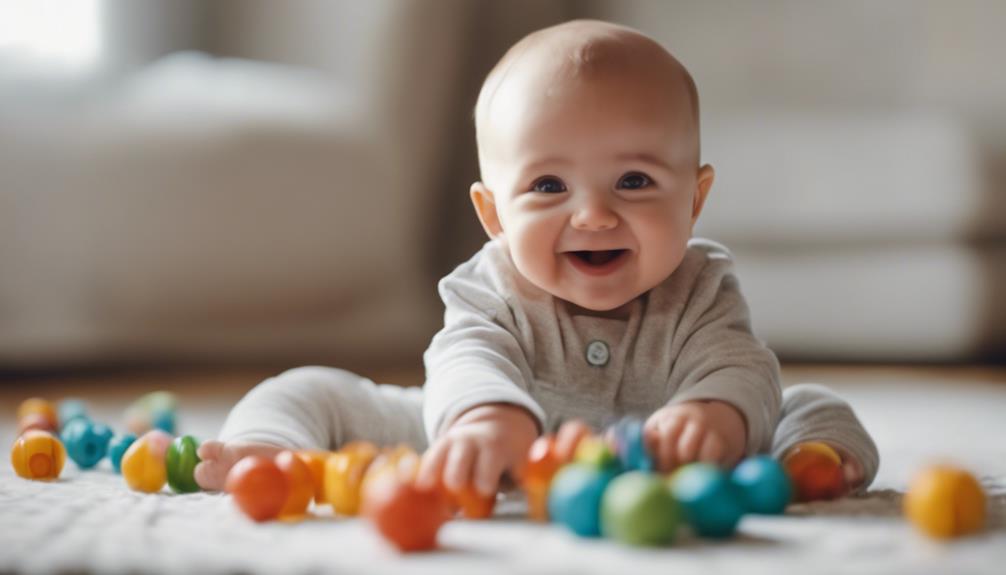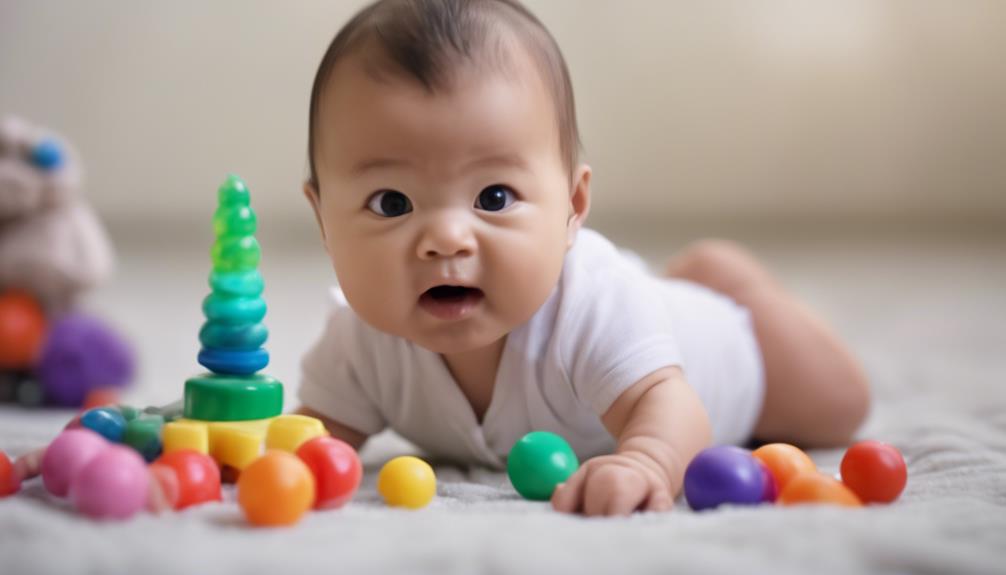Discover the world of baby cognitive development, where infants learn through exploration and interaction. Keep track of milestones such as copying actions and grasping object permanence early on. Memory starts to develop as early as 2 months old, impacting future cognitive abilities. Visual tracking skills progress around 2-3 months, improving coordination and learning. Understanding of object permanence typically emerges between 8-12 months, enhancing memory and problem-solving skills. Language skills evolve from babbling to forming sentences, while memory and attention play crucial roles in overall cognitive growth. Look out for signs of delays and take action promptly to assist your child’s cognitive development journey. Find out how to stimulate cognitive growth through engaging activities and supportive environments. Unlock your little one’s cognitive development potential today.
Key Takeaways
- Encourage problem-solving with challenging toys.
- Use sensory experiences to enhance cognitive skills.
- Promote object permanence through games like peekaboo.
- Create a safe, stimulating environment for learning.
- Engage in interactive activities like reading and singing.
Cognitive Development Overview
Understanding the fundamentals of cognitive development in babies is essential for fostering their growth and learning abilities. Babies' cognitive development encompasses the progression of thinking, learning, and problem-solving skills. As infants grow, they begin to explore their environment, grasping basic concepts like object permanence – understanding that objects continue to exist even when out of sight.
These cognitive milestones serve as markers for healthy brain development in babies.
To support cognitive growth in infants, social interactions, sensory experiences, and responsive caregiving play pivotal roles. Engaging with your baby, providing varied stimuli, and offering nurturing responses all contribute to their cognitive advancement.
It's vital to be attentive to potential cognitive delays early on, as timely identification allows for effective interventions and support to enhance the baby's development. By encouraging cognitive exploration in a nurturing environment, you lay a strong foundation for your baby's future learning and intellectual growth.
Developmental Milestones Timeline

As your baby grows, you'll witness significant cognitive milestones unfolding at different stages. These markers indicate your child's age-related progression in understanding the world around them.
Key Milestone Markers
Track your baby's developmental milestones using a timeline to monitor their cognitive progress and detect delays early. Cognitive developmental milestones are important indicators of your child's development.
By 9 to 12 months, your baby should show interest in picture books, imitate basic actions, understand object permanence, and respond to interactions.
Between 1 to 2 years, they should identify similar objects, imitate adult actions and language, point out familiar objects and people, and grasp simple words.
By 2 to 3 years, your child should be able to recognize themselves in a mirror, name objects from a book, sort items into categories, and imitate complex adult actions.
Monitoring these milestones is crucial as it can help in early detection of developmental delays, allowing timely interventions through early childhood education programs and support services like early intervention programs. Ensuring your child achieves these milestones on time is key for their cognitive growth and overall development.
Age-Related Progression
Infants at 9-12 months of age should demonstrate enjoyment in looking at picture books, imitating basic actions, and understanding object permanence. As your child grows, their cognitive skills continue to develop.
Here are some age-related milestones to look out for:
- 1-2 years: Children can identify similar objects, imitate adult actions and language, and respond to words.
- 2-3 years: Kids should recognize their reflection, imitate complex adult actions, name objects from books, and sort objects into categories.
- Early Intervention: Early intervention services can help children meet cognitive milestones and address any delays in development.
- Tracking Progress: Understanding age-related cognitive milestones is important for tracking a child's progress and providing appropriate support. By being aware of these stages, you can make sure your child is on the right path and intervene if needed.
Early Cognitive Skills
When considering early cognitive skills in babies, it's crucial to focus on memory development, visual tracking skills, and understanding object permanence.
These foundational skills lay the groundwork for more complex cognitive abilities as your child grows.
Infant Memory Development
Developing memory skills in babies is a vital aspect of their early cognitive development. Infants start forming memories through exposure to sensory stimuli, which is further reinforced by interactions with caregivers and environmental cues. By around 2 months of age, babies can remember familiar voices and faces, showing the beginnings of memory retention.
Initially, infants' memories are short-lived, but as they grow, their ability to retain information improves gradually. Early memory development in infants plays a crucial role in shaping their cognitive abilities for the future.
- Infants develop memory skills through exposure to sensory stimuli.
- Caregiver interactions and environmental cues influence memory formation in babies.
- Babies as young as 2 months can remember familiar voices and faces.
- Infant memories are initially short-lived but enhance with age, setting the stage for later cognitive abilities.
Visual Tracking Skills
Around 2-3 months of age, infants begin developing essential visual tracking skills, enabling them to follow moving objects with their eyes. This skill plays an important role in cognitive development, helping infants understand their environment and enhancing hand-eye coordination.
You may notice your baby turning their head or moving their eyes to track objects, showcasing the progression of their visual tracking abilities. These skills are fundamental for future learning tasks such as reading and engaging in visual-motor activities, underscoring their significance in cognitive development.
To further enhance your infant's visual tracking skills and overall cognitive development, engaging them in activities that involve tracking moving objects can be beneficial. By providing opportunities for your baby to practice tracking objects, you're aiding in the development of important cognitive skills that will benefit them in various learning tasks and activities as they grow.
Object Permanence Understanding
Understanding object permanence is an essential early cognitive skill that infants typically develop around 8-12 months of age through engaging in activities like hidden object games. This milestone marks a significant step in cognitive development as it involves grasping the concept that objects still exist even when out of sight.
Here's a breakdown of how object permanence understanding impacts infant cognitive development:
- Mental Representation: Infants showing signs of object permanence can mentally represent objects, understanding that a toy hidden under a blanket still exists.
- Memory Development: Mastery of object permanence is linked to memory skills, as infants remember the location of hidden objects.
- Problem-Solving Skills: Object permanence also plays a role in enhancing problem-solving abilities, as infants learn to search for hidden objects based on memory cues.
- Hidden Object Games: Activities like peek-a-boo help reinforce object permanence understanding in infants, aiding in their cognitive growth.
Language Development
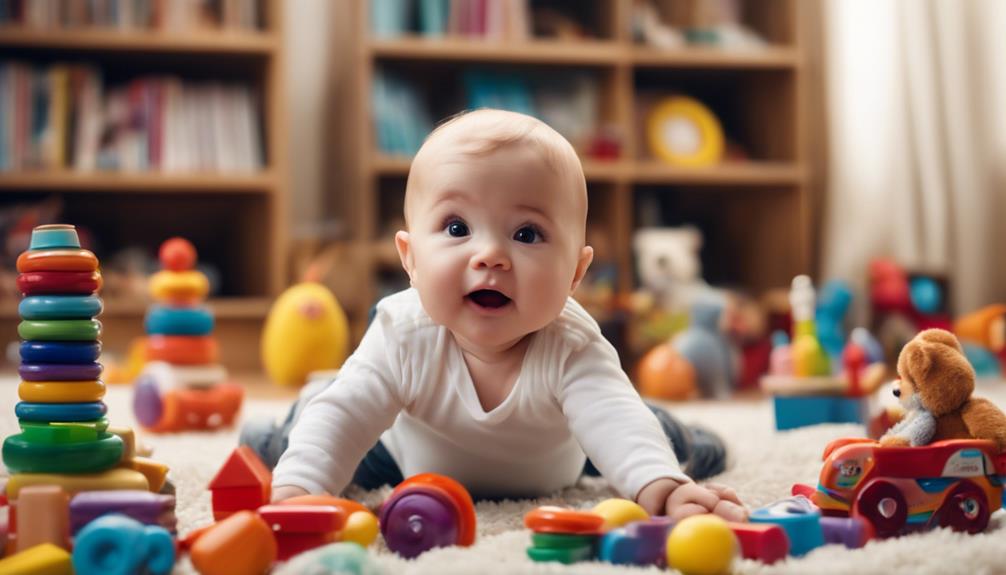
From around 6-9 months of age, infants begin their language development journey with cooing and babbling sounds. As they grow, by 12 months, they start uttering simple words like 'mama' or 'dada' and grasp basic commands. By the time toddlers reach 1-2 years old, they typically have a vocabulary of 50-100 words, and they begin stringing words together to form simple sentences.
At this stage, they also start engaging in conversations, asking questions, and using more complex language structures.
Encouraging language development in infants and toddlers is essential as it enhances their communication skills. Reading to them, singing songs, and talking to them regularly can greatly aid in their language growth. By providing a language-rich environment, you can help nurture their ability to express themselves effectively and understand the world around them.
Memory and Attention
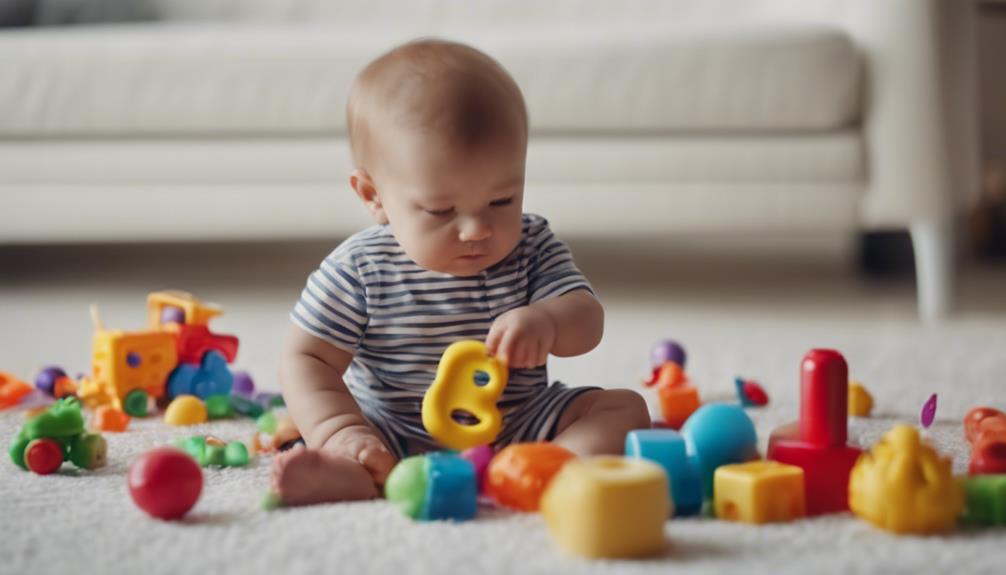
Infants as young as 2 to 3 months old begin developing their memory capacity, laying the foundation for future cognitive growth. Memory and attention are essential aspects of infant development, influencing their learning and exploration.
Here are key points to keep in mind:
- Memory Skills: Infants progress from recognizing familiar faces to recalling events over time, showcasing the growth of their memory capacity.
- Attention Span: From infancy to toddlerhood, attention span gradually increases. By 2 to 3 years old, children can focus for short periods on activities they enjoy.
- Selective Attention: Around 9 to 12 months, infants start demonstrating selective attention, showing the ability to focus on specific stimuli or tasks.
- Cognitive Processes: Attention and memory are interconnected cognitive processes essential for infant development, paving the way for enhanced cognitive abilities as they grow.
Understanding how memory and attention evolve in infants is important for nurturing their cognitive development effectively.
Cognitive Delays Recognition
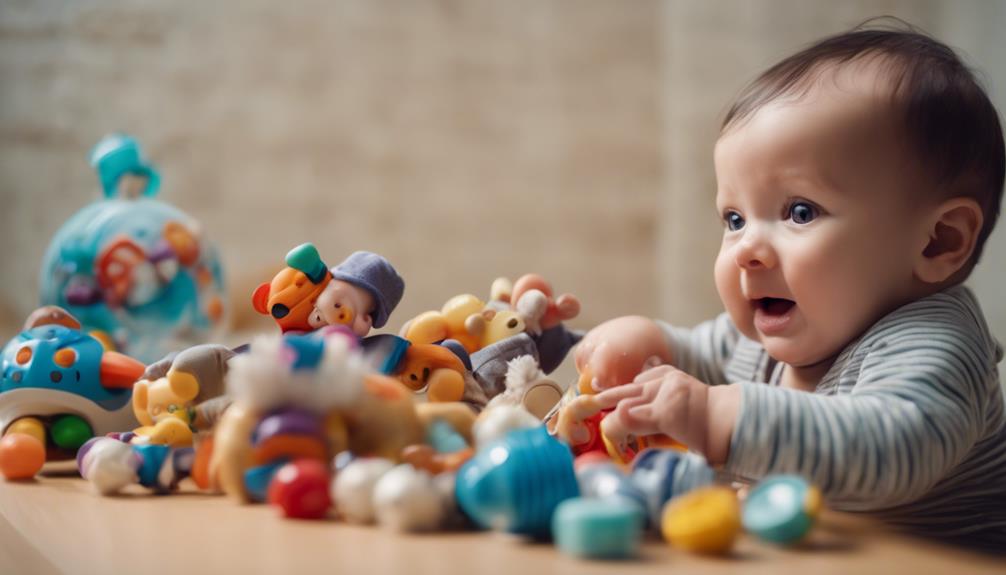
Identifying signs of cognitive delays in young children is essential for timely intervention and support. Cognitive delays in infants and toddlers can manifest through various indicators such as a lack of interest in their surroundings, difficulties with problem-solving tasks, and delayed speech development. These delays may stem from genetic conditions, health issues, or environmental factors affecting the child's development.
Recognizing these signs promptly is vital. Involving the family, seeking evaluation from a pediatrician, and connecting with early intervention programs are important steps in the process.
Early intervention plays a significant role in supporting children with cognitive delays. Through thorough assessments and timely support, children can receive the assistance they need to enhance their cognitive development.
Stimulating Cognitive Growth

To enhance your baby's cognitive development, engaging in interactive activities like reading, singing, and talking is essential.
Here are some ways you can stimulate your baby's cognitive growth:
- Encourage problem-solving: Provide toys that challenge your baby to figure out how they work, promoting cognitive skills and fine motor development.
- Utilize sensory experiences: Introduce different textures and sounds through play to enhance cognitive abilities and sensory processing.
- Promote object permanence: Play games like peekaboo to help your baby understand that objects still exist even when they're out of sight, aiding in memory retention.
- Create a safe and stimulating environment: Make sure your baby has a secure space to explore and learn, with varied stimuli to encourage cognitive development milestones.
Frequently Asked Questions
How Can I Stimulate My Baby's Cognitive Development?
To stimulate your baby's cognitive development, engage in interactive activities like peek-a-boo and provide various sensory experiences. Encourage exploration with age-appropriate toys, read books, and create a safe, stimulating environment for learning and growth.
What Are the Stages of Cognitive Development in Infants?
As your baby grows, you'll witness fascinating cognitive leaps. From simple reflexes to babbling and eventually forming first words, infants progress through stages of sensorimotor exploration, social learning, and developing intentional communication.
What Are Four Signs of Intellectual Growth in an Infant?
When observing an infant's intellectual growth, notice their curiosity in exploring, imitation of adult actions, recognition of familiar objects, and understanding of object permanence. Sorting objects into categories like shapes or colors also signals cognitive development.
What Is Cognitive Development in 0 to 12 Months?
In the first year, your baby's cognitive development is a whirlwind of growth. From basic exploration to understanding cause and effect, object permanence, and imitation, these milestones set the stage for future learning.
Conclusion
To sum up, nurturing your baby's cognitive development is essential for their overall growth and learning.
Remember, just like planting seeds in a garden, fostering your baby's cognitive skills takes time, patience, and consistency.
By engaging in stimulating activities, encouraging language development, and being aware of potential delays, you can help your little one reach their full cognitive potential.
Keep fostering those little minds, and watch them bloom into bright, curious individuals.

